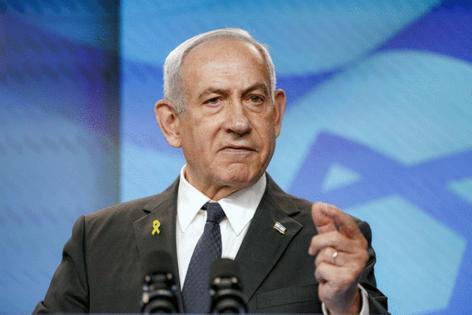Israel kills Hezbollah chief in Beirut as truce with Lebanon wavers
Published in News & Features
Israel said it killed Hezbollah’s military chief in a rare airstrike on Beirut as an almost year-old ceasefire deal with the Lebanese government wavers.
The Israeli army said the attack on Dahieh, on the southern outskirts of the capital, killed Hezbollah chief of general staff Abu Ali Al-Tabtabai, the militant group’s No. 2 after Secretary-General Naim Qassem.
He was “part of Hezbollah’s senior leadership and, due to his connections and abilities, served as a significant source of knowledge and influence within Hezbollah,” the Israel Defense Forces said in a statement.
The daylight attack on Dahieh, on the southern outskirts of the capital, was the first of its kind in months and left five people dead and 28 injured, according to Lebanon’s health ministry. It was ordered, according to Prime Minister Benjamin Netanyahu’s office, to thwart the commander’s efforts to build up the Iran-backed faction’s capabilities.
There was no immediate comment on the incident by Hezbollah, but Lebanese President Joseph Aoun said the strike was more evidence that Israel doesn’t heed “recurring calls to halt its assaults on Lebanon.”
The Nov. 27, 2024, ceasefire deal, mediated by Washington, required that Lebanon’s government and its army remove Hezbollah from southern areas near the Israeli border, and strip it of weaponry. The deal calmed what had been the second front to a regional conflict sparked by Hamas’ October 2023 attack on Israel from Gaza.
Though Hezbollah ceased its missile attacks, it refused to freely give up its arsenal. Israel, citing a self-defense provision in the ceasefire agreement, has waged a campaign of lethal air strikes against what it describes as Hezbollah’s efforts to rearm and regroup. Those attacks have surged recently to an almost daily pace.
“We will continue to do everything necessary to prevent Hezbollah from reestablishing its threat capability against us,” Netanyahu told his cabinet in broadcast remarks on Sunday, hours before the Beirut attack.
In August, the Lebanese government instructed its army to draw up a plan for disarming Hezbollah and other militias. The first phase focuses on south Lebanon and should be finalized by the end of the month, Prime Minister Nawaf Salam said in a Bloomberg interview on Nov. 20. Beirut and the Bekaa Valley are encompassed in later stages.
However, both Israel and the U.S. have voiced doubts about Beirut’s ability to deliver. Lebanese leaders have in turn warned that Israel’s actions are undermining the truce.
Though required by the ceasefire to withdraw from Lebanon, Israel maintains five army outposts in vantage points across the border. It’s offered to remove those in return for Lebanese Armed Forces action to disarm Hezbollah, which the U.S. designates as a terrorist group. Israel and Lebanon are technically in a state of war.
Israel in July 2024 killed Fuad Shukr, who at the time was Hezbollah’s military chief, in an airstrike on Beirut.
Al-Tabtabai was designated in 2016 as a global terrorist by the U.S. State Department for his activities in Syria and Yemen. The U.S., on its “Rewards for Justice” website, offers as much as $5 million for information on his whereabouts.
A veteran operative since the 1980s, Al-Tabtabai “commanded the Radwan Force, led Hezbollah operations in Syria, and entrenched its operational and combat capabilities,” according to the IDF.
_____
©2025 Bloomberg L.P. Visit bloomberg.com. Distributed by Tribune Content Agency, LLC.







Comments